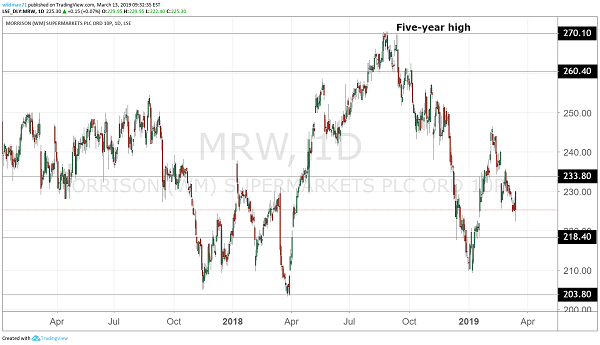
Morrisons keeps income investors happy
By Graeme Evans from interactive investor.
After flagging another special dividend with annual results, there are opportunities for this grocer.
In an eventful and turbulent period for the grocery sector, Morrisons (LSE:MRW) continues to hold its own after unveiling further robust profits growth and another special divi for investors.
Today’s full-year results, despite drifting back after an initial rally, were largely well-received. It’s a further boost to the reputation of chief executive David Potts, who has revived the Bradford-based grocer thanks to a focus on customer service, range enhancements and better stock availability.
Shoppers seem to have noticed, with like-for-like sales up 4.8 per cent in 2018/19 and customer satisfaction scores up 20 percentage points in the four years since Potts took over.
Alongside today’s 10 per cent rise in pre-tax profits, highlights from an investor viewpoint were focused on the £265 million of free cash flow and 25 per cent hike in dividend to 12.6p a share, including a further 4p special award unveiled with today’s figures.
The total dividend beat consensus by more than 11 per cent, according to analysts at Bernstein. They added:
“At yesterday’s share price, this is a 5.6 per cent dividend yield for a company with almost no leverage, solid execution and more earnings and free cash flow growth to come.”
They think that Morrisons shares have the potential to be trading at 280p, compared with 225p today. Analysts at Jefferies are at 265p, having drawn encouragement from the company’s own comments that it has “many sales and profit growth opportunities ahead”.

Source: TradingView (*) Past performance is not a guide to future performance
Jefferies described Morrisons as an attractive UK domestic play, arguing that the supermarket could benefit from a number of potentially positive developments in 2019/20.
One of them stems from the proposed Sainsbury’s (LSE:SBRY) and Asda merger, which is under threat following a recent critical report from the Competition and Markets Authority. Jefferies analysts think it could be a favourable outcome for Morrisons if the deal’s failure leads to Asda shifting from Wal-Mart to private equity ownership.
They also see potential positives if German discounters Lidl and Aldi decide to dial back their store ambitions in the face of slowing like-for-like sales momentum.
Of course, the big unknown for all supermarkets concerns the impact of Brexit. After a strong summer, helped by favourable weather and the football World Cup, Morrisons noted a change in consumer behaviour as uncertainty around Brexit led to customers becoming more cautious. This meant like-for-like sales growth slowed to 3.8 per cent in the fourth quarter.
Morrisons is also focused on its wholesale supply offer, which has grown more quickly than expected following a partnership with McColl’s. Having achieved its initial aim of £700 million of sales ahead of the 2018 year-end, the company expects to be supplying McColl’s remaining 300 convenience stores towards the end of 2019 as it looks to meet a £1 billion target.
Shore Capital analyst Clive Black praised Potts for engineering a broader and more resilient business through which to grow. He added:
“Such an outcome is no mean feat — a far cry from the misplaced market views of this team in 2015 — but we believe there is more to come from a balanced and disciplined approach.”
Today’s results from the UK’s fourth biggest supermarket chain set an interesting benchmark for Tesco and Sainsbury’s ahead of their full-year figures on April 10 and May 1 respectively.
*Horizontal lines on charts represent levels of previous technical support and resistance.
These articles are provided for information purposes only. Occasionally, an opinion about whether to buy or sell a specific investment may be provided by third parties. The content is not intended to be a personal recommendation to buy or sell any financial instrument or product, or to adopt any investment strategy as it is not provided based on an assessment of your investing knowledge and experience, your financial situation or your investment objectives. The value of your investments, and the income derived from them, may go down as well as up. You may not get back all the money that you invest. The investments referred to in this article may not be suitable for all investors, and if in doubt, an investor should seek advice from a qualified investment adviser.